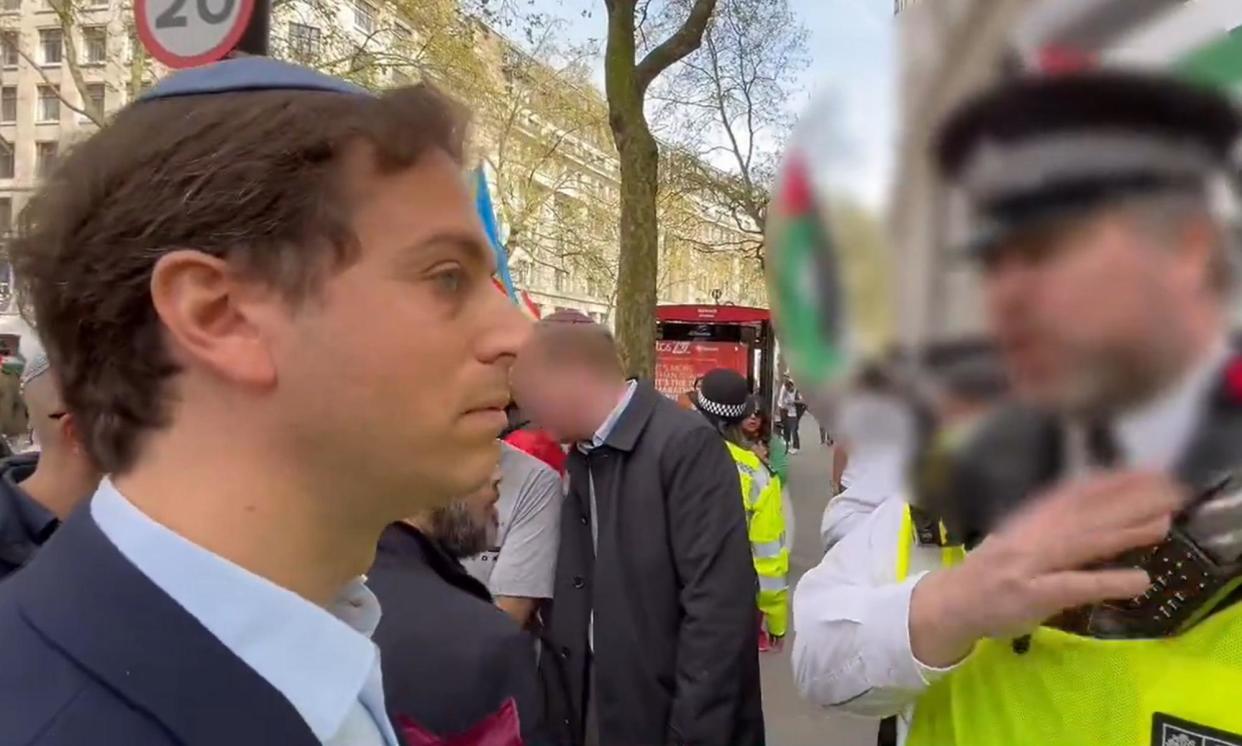What is CAA, the group headed by campaigner in Met police antisemitism row?

Who is the Campaign Against Antisemitism?
The group, which is led by Gideon Falter, was founded in response to the 2014 Israel-Gaza offensive, by a group of activists concerned about rising antisemitism and who believed some Jewish communal organisations such as the Board of Deputies were not doing enough to robustly combat antisemitism at protests and in the media.
Its first protest was against the Tricycle Theatre in London, which had cancelled hosting the UK Jewish film festival while it was partly funded by the Israeli embassy, though the theatre had initially offered to find alternative funding.
The group has organised a number of protests against antisemitism as well as counter-demonstrations during the pro-Palestinian marches following Israel’s offensive in Gaza in the wake of the 7 October attacks. Politicians including Boris Johnson attended a CAA-organised march against antisemitism last year, with tens of thousands of participants, amid an increased number of antisemitic attacks.
Na’amod, the Jewish group campaigning for a ceasefire in Gaza, said it would not take part in the march, saying it was “pitting Jewish safety against Palestinian freedom”.
How did the group rise to prominence?
CAA was a key organiser against Jeremy Corbyn’s leadership of the Labour party and campaigned over the handling of antisemitism complaints during his tenure, organising multiple demonstrations outside Labour HQ.
The group, along with the Jewish Labour Movement, made the complaints that sparked the Equality and Human Rights Commission investigation into Labour antisemitism, which concluded that the party had breached the law.
Since the inquiry, the group has pursued complaints against individual Labour MPs, including the deputy leader, Angela Rayner.
The group also uses the courts to pursue convictions for antisemitic hate speech, including a private prosecution of the Holocaust denier Alison Chabloz.
Is it a political group?
CAA has worked with MPs from different parties and is a registered charity but a number of MPs and external groups have expressed concern about its political activity.
The group has continued to forcefully criticise Labour under Keir Starmer’s leadership, including the Labour leader’s visit to the Holocaust memorial in Berlin.
Two prominent Jewish parliamentarians, Margaret Hodge and Ruth Smeeth, have criticised CAA’s approach. “I’m fed up of CAA using antisemitism as a front to attack Labour. Time to call them out for what and who they really are,” Hodge tweeted after Starmer’s memorial visit. “More concerned with undermining Labour than rooting out antisemitism.” CAA has said it makes “complaints against antisemites in all walks of life”.
There is also reportedly some tension with Jewish communal organisations such as the Board of Deputies and the antisemitism monitoring body the Community Security Trust, which some supporters of the CAA believe have not been supportive enough of Falter’s efforts. CAA says it has good, cooperative relations with CST.
What happened during the protests last weekend?
Footage released by the CAA last Friday showed Falter being told by a police officer that his “openly Jewish” appearance risked antagonising pro-Palestinian marchers.
Related: Met police chief praises ‘professional’ conduct of officer in antisemitism row
In the initial clip, Falter, who was wearing a kippah, has his way blocked by an officer who says: “You are quite openly Jewish, this is a pro-Palestinian march, I’m not accusing you of anything but I’m worried about the reaction to your presence.” Falter was offered a police escort around the marchers and told that if he chose to walk through the march, he would be arrested for a “breach of peace”.
The conversation with the officer led to widespread condemnation and calls for Met commissioner Sir Mark Rowley’s resignation, and Jewish community bodies expressed significant alarm. Louise Casey, who authored a major review of the Met police, called it “absolutely horrific communication handling by the Metropolitan police. Can it get any worse if you’re Jewish and live in London?”
A longer version of the clip released later shows the officer explaining to Falter that his approach was informed by the knowledge he had already deliberately walked out into the middle of the march and was therefore “looking to try and antagonise this”.
John Mann, the government’s antisemitism tsar, said Falter had been “quite explicit” about his intentions at the protest. “There’s no ambiguity in what he’s doing,” he told the BBC, saying he had been blocked by the CAA on the social media platform X and they were “not playing it straight”.
CST, the main body that monitors antisemitism, said that while it condemned the language used by the police, it had confidence in the Met to protect Jewish Londoners.


